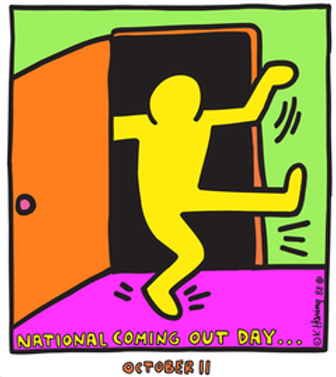“I… I think I’m a homosexual.”
I shifted my ball cap, so my eyes were shaded completely. I didn’t want anyone in the busy McDonalds on College Avenue to see my tears. I felt the hard, off-white, plastic curve of the bench press up against my thigh as I nervously bounced my leg up and down. A faint smile flickered across my face as I thought how my mother would yell at me for jogging my leg and vibrating the table. It quickly faded as I wondered how she would react if she had heard what I just said.
It was October 11, 1991 about 3:30 in the afternoon, the fourth annual National Coming Out Day. It was the first time I had ever said those words out loud. My InterVarsity Christian Fellowship mentor said nothing for several moments. My rocking leg felt like a metronome, keeping time to a symphony of silent condemnation.
“Wow, it took a lot of courage for you to tell me that,” he finally said. “But I don’t think you are.”
My leg stopped bouncing as his words wound their way through the muffled voices of shame filling my head. A look of disbelief escaped from under the brim of my hat. He had folded his hands in front of his mouth, like a schoolboy praying before his lunch. My eyes narrowed as I unfolded my leg to adjust myself into a more engaged position. As I adjusted, my shin scraped up against the strangely angled metal support holding the table to the divider I was leaning against. Ouch! That’s going to leave a mark, I thought.
“What do you mean?” I blurted out, rubbing my shin, wishing I was anywhere but here. My brain was refusing to make sense of any of this and was now screaming at me to run away. Why was I here? Why had I betrayed myself, sharing one of my deepest secrets with a guy who was might now cut me off from a group I had desperately clung to since coming to Penn State?
“We all have sin in our lives, Bill. This is just your cross to bear. Mine is…”
My mind trailed off. All day the steps of the Schwab Auditorium were filled with people coming out of a huge doorway, announcing their sexual orientation, celebrating their freedom, being applauded for their courage. 40 yards away, the Willard Preacher yelled messages of condemnation, attempting to drown out their celebration. I had stood a safe distance away, listening for hours, up until it was time to meet my mentor.
I put my head down as I wound through the two opposing crowds. I recognized several faces from the InterVarsity group listening attentively to the Willard Preacher. Hoping to avoid eye contact, I turned my back toward the preacher, sliding sideways between a group of students offering pamphlets about AIDS and another group inviting people to a Bible study. This was, in many ways, the ultimate outward expression of the daily conflict I felt inside—conservative Christian rhetoric yelling so loudly I could barely hear a timid voice telling the world he was different.
By the time I got to McDonalds, I had decided I needed to blurt out my confession as soon as possible, otherwise I knew I’d lose my courage like countless times before. For the first time in my life, I’d let my secret out, only to be told I was wrong about myself. I left that conversation confused and ashamed.
I would muster the courage to tell at least a dozen other people I was gay over the next 14 years. Over half of them wouldn’t hear it, telling me I wasn’t “really a homosexual.” Eventually, I would change my confession to say I struggled with “same-sex attraction,” a more palatable wording for the Evangelical people surrounding me.
During those years, I attended ex-gay ministries, responded to countless alter calls of confession, joined sexual-purity groups, and even asked church elders to perform exorcisms on me. Through it all, I was still gay, and others continued to disagreed. I even sat across from a therapist who suggested I stop telling others that I struggle with same-sex attraction and begin claiming my victory over this sin by saying “I used to struggle…”
Have you ever endured being told you are something other than who you know yourself to be? Have you experienced the surge of anxiety coursing through your body as you reveal a deep-seated truth about yourself only to have this invaluable gift rejected?
In my own life as well as in my therapy practice, I frequently witness the consequences of people internalizing varying degrees of this rejection. From a parent who says, “don’t be rude, give your grandfather a hug,” to spouse who says “you can’t be transgender, we’ve been together for years. I would have known,” the damage of these messages reverberates to the core of the individual. It can shatter a soul’s foundation.
What motivates someone to reject an invitation to know someone more intimately? Even saying “no, you’re not FAT!” can be damaging, regardless of the intention. Essentially, I believe these rebuttals can be boiled down into this self-centered idea—I cannot cope with the feelings I’m having as a result of what I’ve just learned about you. It is more important for me to protect myself than it is to accept your vulnerability.
You should be ashamed of yourself.
What you are feeling is not real
You don’t know who you are.
It’s all in your head.
You are wrong.
This Friday, October 11th is National Coming Out Day. If you are fortunate enough to have someone reveal an intimate part of themselves to you, I encourage you to embrace them and be grateful for the invaluable gift you’ve been given.
If you’d like to share part of your journey with me, I invite you to connect with me at: WillKoehlerLCSW@aTraumaInformedLife.com or find me on Facebook, Twitter, or Instagram.





